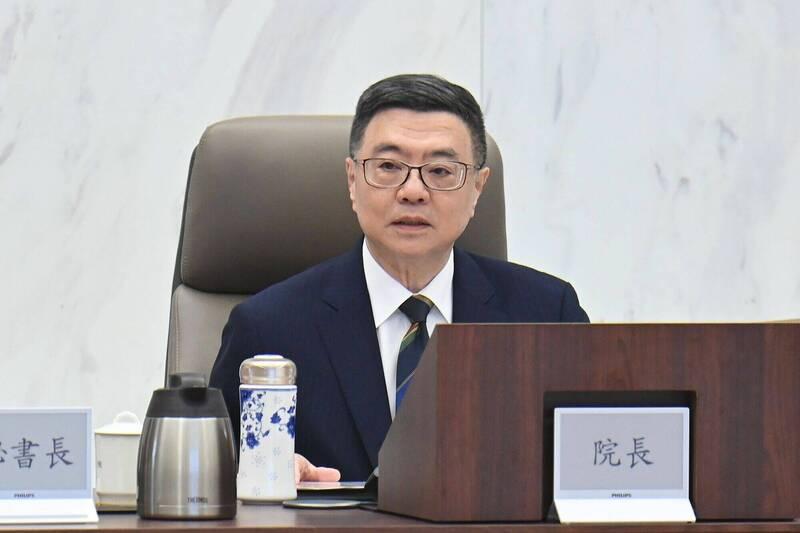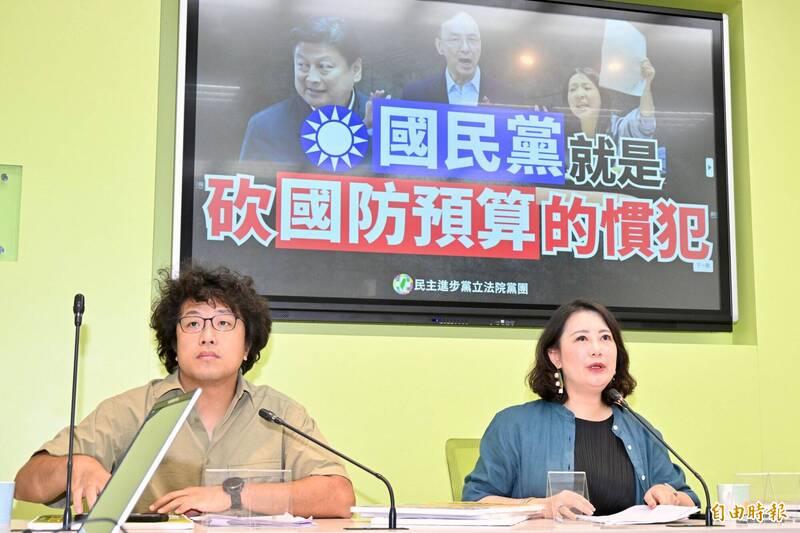Premier Cho Jung-tai (卓榮泰) today said that the opposition’s proposal to repurpose NT$150 billion (US$5.2 billion) of the special budget, previously allocated for whole-of-society defense resilience, as cash handouts was “completely unacceptable and irresponsible.”
The Legislative Yuan tomorrow is to decide how to allocate the NT$410 billion special budget approved by the Cabinet to enhance national security and boost economic resilience in the face of US tariffs.
Speaking at a news conference after a meeting at the Executive Yuan in Taipei, Cabinet spokeswoman Michelle Lee (李慧芝) quoted Cho as saying that slashing the budget would burden the public with the cost of maintaining basic supplies and homeland security — duties the government ought to bear.

Photo courtesy of the Executive Yuan
The national budget must be seen as a whole, and there must be no gaps in the national security network, Cho said.
The Democratic Progressive Party (DPP) said that the proposal by Chinese Nationalist Party (KMT) and the Taiwan People's Party would sacrifice Taiwan’s national security, economic stability and international standing.
This is exactly how the opposition “sells out Taiwan,” the party said.

Photo: Tsung Chang-chin, Taipei Times
The Democratic Progressive Party (DPP) criticized the KMT for proposing NT$10,000 cash handouts, saying they were a bid to swing the upcoming recall votes targeting KMT lawmakers.
The NT$150 billion would be used to improve defense storage capabilities, cybersecurity and maritime surveillance, said DPP Legislator Puma Shen (沈伯洋), a member of the legislature’s Committee on Foreign and National Defense Affairs.
Scrapping the budget would send the wrong message to the international community and could cause Taiwan to face further sanctions, while dealing with tariffs and origin fraud, he added.
Meanwhile, the Ministry of National Defense said in a statement that the military would use NT$115.1 billion of the budget to build mobile and backup information and communications infrastructure to be used by the military and civilians.
That would include establishing cloud-based, mobile information networks, expanding satellite leases, updating servers and strengthening cybersecurity defense, it said.
Mobile command posts and microwave technology would also be implemented in all combat zones and on the Wuchiu (烏坵) islands in Lienchiang County (Matsu), the ministry said.
A shared information and intelligence platform would then be built using radar data provided by the Coast Guard Administration, the army and the navy, it said.
Lastly, the budget would be used to improve emergency repair capabilities for fiber optic networks to ensure stable communication and swiftly restore connections after disruption, it said.
The budget would also be used to bolster preparedness by increasing stockpiles of spare parts, fuel and drinking water, while upgrading storage facilities and engineering equipment, the ministry said.
These initiatives would improve the military’s ability to respond to China’s “gray zone” tactics and sustain operations, it said.
Finally, military training grounds would be upgraded to meet increasing needs for new equipment, reserve forces and wartime simulation training programs, it said.
The annual budget alone would be not be sufficient to counter possible threats in light of recent regional instability and intimidation, the ministry said.
The special budget is required to concentrate resources, prioritize construction and enable rapid procurement, which in turn, enables Taiwan to maintain military strength at critical moments, stimulate the domestic economy and build a safe and resilient nation, it added.

Nipah virus infection is to be officially listed as a category 5 notifiable infectious disease in Taiwan in March, while clinical treatment guidelines are being formulated, the Centers for Disease Control (CDC) said yesterday. With Nipah infections being reported in other countries and considering its relatively high fatality rate, the centers on Jan. 16 announced that it would be listed as a notifiable infectious disease to bolster the nation’s systematic early warning system and increase public awareness, the CDC said. Bangladesh reported four fatal cases last year in separate districts, with three linked to raw date palm sap consumption, CDC Epidemic Intelligence

Two Taiwanese prosecutors were questioned by Chinese security personnel at their hotel during a trip to China’s Henan Province this month, the Mainland Affairs Council (MAC) said yesterday. The officers had personal information on the prosecutors, including “when they were assigned to their posts, their work locations and job titles,” MAC Deputy Minister and spokesman Liang Wen-chieh (梁文傑) said. On top of asking about their agencies and positions, the officers also questioned the prosecutors about the Cross-Strait Joint Crime-Fighting and Judicial Mutual Assistance Agreement, a pact that serves as the framework for Taiwan-China cooperation on combating crime and providing judicial assistance, Liang

Reports of Taiwanese going missing, being detained or interrogated, or having their personal liberties restricted in China increased about fourfold annually last year, the Mainland Affairs Council (MAC) said yesterday. Last year, 221 Taiwanese who traveled to China were reported missing, were detained and interrogated, or otherwise had their personal freedom restricted, up from 55 the previous year, the council said. Reopening group tours to China would be risky, as it would leave travelers with no way to seek help through official channels after Beijing shut down dialogue between the associations tasked with handling cross-strait tourism, the MAC said. Taipei’s Taiwan Strait Tourism

The manufacture of the remaining 28 M1A2T Abrams tanks Taiwan purchased from the US has recently been completed, and they are expected to be delivered within the next one to two months, a source said yesterday. The Ministry of National Defense is arranging cargo ships to transport the tanks to Taiwan as soon as possible, said the source, who is familiar with the matter. The estimated arrival time ranges from late this month to early next month, the source said. The 28 Abrams tanks make up the third and final batch of a total of 108 tanks, valued at about NT$40.5 billion